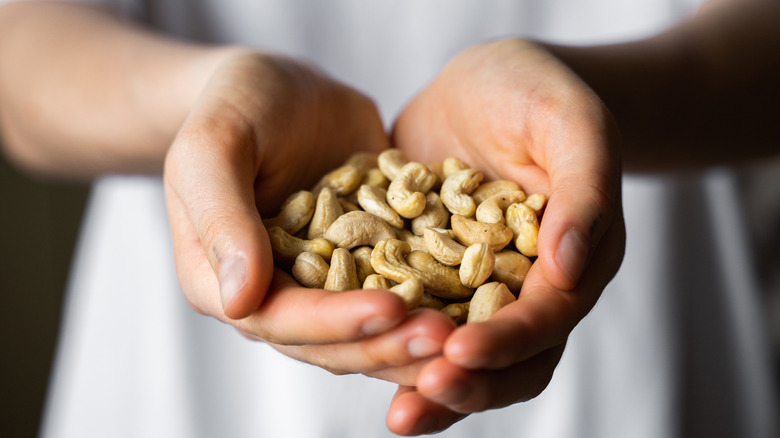
Science has shown links between nut consumption and a reduced risk of certain cancers, cancer mortality, and increased patient survival rates with some site-specific cancers (via Nutrients). In addition, cashews — along with pistachios, walnuts, and almonds — are a type of tree nut that have also demonstrated a potential to lower the risk of recurrence of certain cancers (via Journal of Clinical Oncology).
According to findings of a 2021 systematic review published in Advances in Nutrition, people who ate greater amounts of tree nuts stood at a 13% lower risk for overall cancer as well as an 18% lower risk of cancer mortality. Experts trace nuts’ potential cancer-fighting abilities to their antioxidant and anti-inflammatory properties. Cashews also contain a variety of nutrients, some of which have been shown to potentially reduce one’s risk for cancer. Among cashews’ many health benefits, here’s why you might want to add these tree nuts to your diet when it comes to disease prevention.
How cashews and other tree nuts may reduce colon cancer recurrence
In addition to potentially lowering the risk of cancer to begin with, findings from a 2018 observational study published in the Journal of Clinical Oncology suggested that nut consumption may also impact cancer recurrence and survival rates of certain site-specific cancers — specifically, colon cancer. Researchers analyzed the diets of more than 800 patients who had been treated for stage III colon cancer.
Following up with patients an average of 6.5 years later, the study findings revealed that those who ate a minimum of two servings of nuts weekly were less susceptible to cancer recurrence and cancer mortality compared to people who reported that they do not eat nuts. The twist? These findings were specific only to tree nuts. That comes out to a helping of approximately 36 cashews weekly that may benefit patients with colon cancer (via Reuters). What’s more, compared to individuals who were not nut-eaters, patients who consumed over two servings of tree nuts weekly had a 42% reduced risk of cancer recurrence and 57% lower risk of mortality.
Cashews might reduce cancer risk, but you don’t want to eat too many
Commenting on the research outcomes, president of the American Society of Clinical Oncology (ASCO) Daniel Hayes publicly stated, “This study shows that something as simple as eating tree nuts may make a difference in a patient’s long-term survival” (via Reuters). In light of these findings, some experts voiced concerns that people diagnosed with cancer may opt for eating nuts over chemotherapy treatment. Dr. Richard Schilsky, chief medical officer of the ASCO, told STAT News that although tree nut consumption was associated with these positive outcomes, they can’t be determined as the cause; rather, it’s possible other healthy lifestyle habits may also have played a role.
While further research is required, cashews do contain an abundance of essential nutrients, some of which may have protective properties against cancer. For example, in a 1-ounce serving of raw cashew nuts, you’ll find nearly 83 milligrams of magnesium. In a 2022 study published in Cell, researchers found that magnesium supports the healthy functioning of T-cells, which are critical for immunity and disease prevention. Oppositely, magnesium deficiency can come with unexpected side effects, and has been linked with an increased risk of cancer.
It’s important to note that raw cashew nuts are not safe for consumption, and that eating an excess of roasted cashews can increase the risk of kidney stones. Therefore, it’s best to stick to the recommended intake of 1 ounce of cashews daily.







